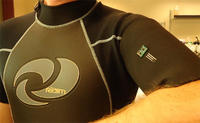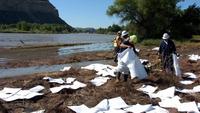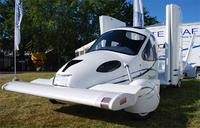-
ASIS Conference: Securing the global supply chain
At the upcoming annual ASIS International security conference, attendees will have the opportunity to learn more about protecting the global supply chain at one of the many educational sessions; officials fear that a terrorist attack on a seaport could cripple a local economy and have global repercussions. As nearly 90 percent of the world’s goods are still shipped via containers on massive transport ships
-
-
Sensors printed on wetsuits detect explosives, other hazards

UC Sand Diego researcher has successfully printed thick-film electrochemical sensors directly on flexible wetsuit material, paving the way for nano devices to detect underwater explosives or ocean contamination; UCSD has a full U.S. patent pending on the technology, and has begun talks on licensing the system to a Fortune 500 company
-
-
Critical vulnerability found in Apple iPhones and iPads
Apple is scrambling to develop a fix for a software vulnerability that leaves its iPhone, iPad, and iPod Touch devices susceptible to hackers; according to Germany’s Federal Office for Information Security, which discovered the critical software vulnerability, hackers can steal confidential data from the devices without the user even suspecting it by exploiting a flaw in the program that allows users to “jail-break” their devices and run non-Apple software
-
-
World's first cardboard vacuum cleaner unveiled

A U.K. vacuum cleaner manufacturer will market a high performance vacuum cleaner constructed out of recycled and recyclable materials; the device was designed by an industrial design student; the corrugated cardboard panels that form the body of the machine are easily replaced if damaged and cost just a tenth of the price of an equivalent plastic panel
-
-
New technology increase potency of beam weapons

Laser scientists and engineers have long recognized that direct-diode lasers can offer significant advantages over other laser technologies due to their efficiency, reliability, compactness, and relatively low cost; applications for direct-diode lasers have been limited, however, owing to their low brightness — a combination of lower power and poorer beam quality relative to alternative laser technologies; a Massachusetts-based company, using wavelength beam combining (WBC) technology, is offering a way to solve this problem — allowing direct-diode lasers to be used in demanding industrial applications — and in effective beam weapons
-
-
IBM helps Sensus secure the smart grid
In a move that could help bolster U.S. smart grids against cyberattacks, Sensus recently announced that it will incorporate IBM’s encryption and key management technologies into its smart grids; the company will use IBM’s cyber security solutions in its FlexNet communications system for electric, gas, and water utility smart grid endpoints including meters and automated distribution devices
-
-
U.K. awards 160 million Pound nuclear decommissioning contracts

The decommissioning of one of U.K. oldest nuclear plants — Sellafield, located close to the village of Seascale on the coast of the Irish Sea in Cumbria, England — has taken a giant step forward thanks to the awarding of three waste retrieval contracts worth more than 160 million Pounds
-
-
Montana floods exacerbate Exxon oil spill

Flooding in Montana has exacerbated the effects of an oil spill and made clean up more difficult for Exxon Mobil; it is estimated that roughly 750 top 1,000 barrels of crude oil have leaked into the Yellowstone River near Billings, Montana; the pipeline has been shut down, but flooding in the area has made it difficult for clean-up crews to find the source of the leak
-
-
A first: Flying car cleared for road

The U.S. Department of Transportation gave Massachusetts-based Terrafugia two important exemptions which would allow the company to offer its flying car — the Transition — to customers next year; the exemptions allow the company to use different tires and different laminated protective glass, and come on top of a 110 lb. allowance the FAA gave the company last year; these allowance and exemptions mean the flying car will not be treated as plane by the FAA, and those who fly it will not have to obtain a pilot license
-
-
MLB, DHS crack down on counterfeiting at All-Star games
Major League Baseball (MLB), the Phoenix police department, and a host of federal, state, and local law enforcement agencies are joining forces to combat counterfeit ticket and merchandise sales during the 2011 MLB All-Star Week; undercover investigators will be roaming the stadium grounds and convention center
-
-
Trapped couple receives bill for stay in New Zealand hotel during quake
A couple stuck in a Christchurch, New Zealand hotel after the 22 February 6.3 magnitude earthquake struck the city, was shocked to discover they had been charged for their stay; a New Zealand man and his wife were trapped on the hotel’s twenty-second floor for hours and eventually were forced to escape after daringly crossing collapsed stair cases, smashing down doors, and crawling to the roof of a parking lot nearby
-
-
Stopping terrorists from using fake IDs at airports

Steve Williams, the CEO of Intellicheck Mobilisa, a technology company that develops wireless identity systems, was recently interviewed by Homeland Security NewsWire’s executive editor Eugene Chow; Williams discusses the ease with which criminals and terrorists use false documents to travel, how pervasive the problem is, and solutions to help stop it
-
-
Japanese discovery could undermine China's rare earth dominance
A new discovery by Japanese researchers could break China’s stranglehold over rare Earth metals; Japanese geologists say they have found large deposits of rare Earth minerals on the floor of the Pacific Ocean; it is estimated that the mud of the Pacific Ocean contains 100 billion tons of these minerals
-
-
Disasters hit businesses hard, keeping many permanently closed
Business owners across the United States are being urged to create emergency plans, so that they can continue operating in the wake of a natural disaster; according to the Insurance Institute for Business and Home Safety, 25 percent of businesses hit by a natural disaster are unable to continue functioning
-
-
Apple latest victim of Anonymous cyberattacks
Apple appears to be the latest victim of the mysterious group of international hackers known as Anonymous; the data breach appears to be relatively minor as the hackers only infiltrated a survey used to process technical support follow-up surveys and obtained twenty-seven internal Apple user names and passwords
-
More headlines
The long view
Ransomware Attacks: Death Threats, Endangered Patients and Millions of Dollars in Damages
A ransomware attack on Change Healthcare, a company that processes 15 billion health care transactions annually and deals with 1 in 3 patient records in the United States, is continuing to cause massive disruptions nearly three weeks later. The incident, which started on February 21, has been called the “most significant cyberattack on the U.S. health care system” by the American Hospital Association. It is just the latest example of an increasing trend.
Chinese Government Hackers Targeted Critics of China, U.S. Businesses and Politicians
An indictment was unsealed Monday charging seven nationals of the People’s Republic of China (PRC) with conspiracy to commit computer intrusions and conspiracy to commit wire fraud for their involvement in a PRC-based hacking group that spent approximately 14 years targeting U.S. and foreign critics, businesses, and political officials in furtherance of the PRC’s economic espionage and foreign intelligence objectives.
European Arms Imports Nearly Double, U.S. and French Exports Rise, and Russian Exports Fall Sharply
States in Europe almost doubled their imports of major arms (+94 per cent) between 2014–18 and 2019–23. The United States increased its arms exports by 17 per cent between 2014–18 and 2019–23, while Russia’s arms exports halved. Russia was for the first time the third largest arms exporter, falling just behind France.
LNG Exports Have Had No Impact on Domestic Energy Costs: Analysis
U.S. liquified natural gas (LNG) exports have not had any sustained and significant direct impact on U.S. natural gas prices and have, in fact, spurred production and productivity gains, which contribute to downward pressure on domestic prices.
